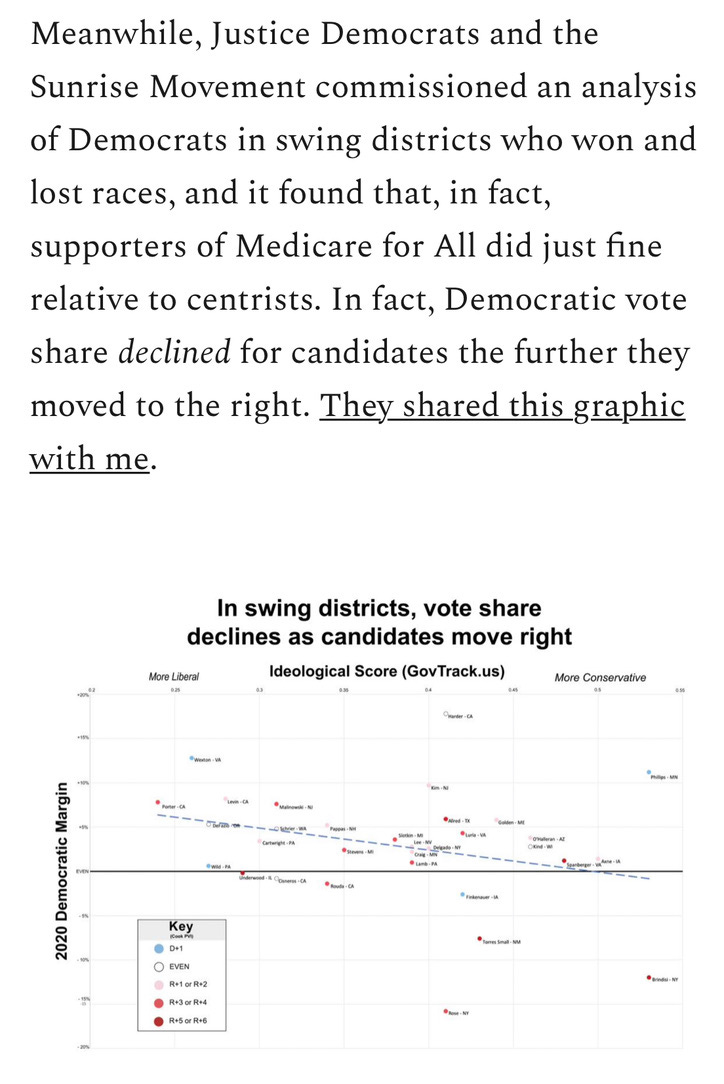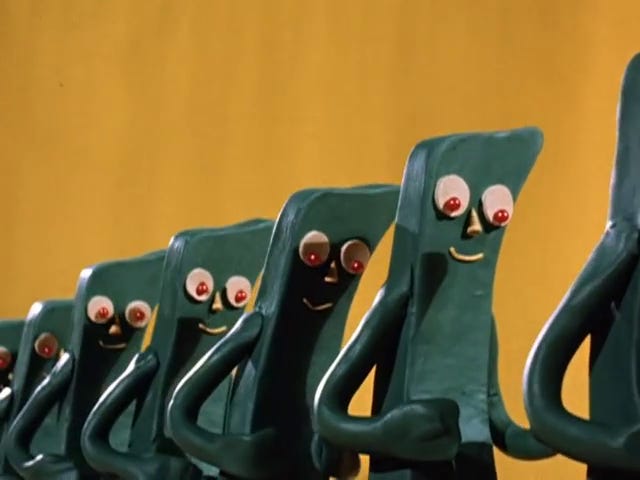Morning, Boys, How's The Water
The same people who tell you we live in 1984 sure seem to think we can only fail The Party, and not vice versa
I wrote two newsletters this week because after finishing this one I thought that maybe I shouldn’t publish it. It is a direct reaction to the joyousness I witnessed over the weekend, and if you are firmly committed to basking in that glow I would encourage you not to read this, and skip over to the other one, which has nothing to do with politics and is commensurately more pleasant. If you think you might get mad reading something that will “yuck your yum,” to use a phrase I hate, continue no further. You have been warned and I swear to God I am going to be upset if you saw this warning, read it anyway, and then got mad at me.
Many people are probably familiar with the joke at the core of David Foster Wallace’s This Is Water, even if they haven’t read Infinite Jest, where it originally appeared. But just in case:
This wise old whiskery fish swims up to three young fish and goes, 'Morning, boys, how's the water?' and swims away; and the three young fish watch him swim away and look at each other and go, 'What the fuck is water?'
The joke isn’t laugh-out-loud funny, just funny in the way things that are tragic and true can be funny.
Of course the wise old whiskery fish must have had some moment or moments of revelation prior to this scenario. A sudden clarity that what surrounded him was not nothing—not the standard and inherent state of the entire universe—but a knowable, nameable set of conditions that the narrowness of his own experience had prevented him from seeing.
There are all sorts of expressions for this important type of moment; “wokeness” has gained traction in recent years because it provides a clear delineation between those who have not yet awoken to the terrible things that happen to people who don’t look like them and those who have. My personal favorite comes from Annie Dillard’s Pilgrim at Tinker Creek, despite being too unwieldy for snappy sloganeering:
I had been my whole life a bell, and never knew it until at that moment I was lifted and struck.
The killings of Trayvon Martin and Tamir Rice did this for me; so too did my first engagement with the ideas of democratic socialism and Marxism—moments that made me realize that my previous worldview was not just flawed, but wholly insufficient to meet the hard truths of the world, in need of a total overhaul. Contained within both of those revelations was the death of “pragmatic liberalism” as a feature of my interior life, a final break with my willingness to accept incremental tinkering as any sort of political solution.
Why this matters is because I see a pressing need for people to start understanding the Democratic Party as less a group of mostly wise, occasionally flawed individuals trying to steer American democracy the right direction and more a teetering pile of consultants and NGOs that are not particularly adept at governing or campaigning, but will happily take your money to keep doing so badly. Here are a pair of images that are burning my insides like poison.
This is not incompetence. This is willful. The Democratic Party has you over a barrel, if you’re the kind of person willing to make some compromises in the hope that better things are possible, and they know it. This is water—and until we name it and become willing to accept the death of our previous assumptions they will keep getting away with it.
I’m sorry, but the people who truly believe that Stacey Abrams or Joe Biden or Kamala Harris or Jon Ossoff or whoever have “saved American democracy” are the fish who have to ask “what the fuck is water?” The faces of the Democratic Party had to move heaven and earth this past week to secure a win in an election that should have been an absolute layup not just because their own malfeasance made the election closer than it had any right to be, but because their position atop the heap depends on the spectacle their failures create. If you’re anything like me you’ve gotten (and unsubscribed to) roughly 500 emails in the past two weeks from PACs you’ve never heard of, an increasingly dramatic subject line adorning each.
CHUCK: MITCH MCCONNELL HAS JUST THREATENED TO PORK MY WIFE.
CHARLES: I HAVE A FIFTH OF VODKA AND A GUN. TELL DONALD TRUMP THE ELECTION IS NOT HIS TO STEAL.
BLUE VOTERS: TAKE THIS SURVEY NOW OR JAIME HARRISON WON’T LET ME SEE MY KIDS AGAIN.
If they can catch you up in the panic—Democracy is on the ballot, you stupid asshole! Give us more money!—then you will be too distracted to ask whose fault the panic was in the first place. And it works! It works.
There is no American democracy to save, at least not in the sense that people mean when they say stuff like that. Does it really feel like you or anyone else you know has a whole lot of say in what happens in your government, particularly if you live in a state whose electoral votes are never in question? Or do you feel like with each passing year you are told to make more and more frequent and disastrous compromises so as not to give over to an even more explicitly hopeless future?
When I sit down to write this each week, I do not do so with the intent to make people feel worse or crush their spirits. How can I burst the bubble of people I care about? is not a thought that regularly crosses my mind. And trust me when I say I shared in the feeling of relief that swept the nation on Saturday morning. But I truly believe that making more of this victory than it is, and making more of the people involved than they are, is not a harmless overreaction—it is an active hindrance to making progress in the years to come. Joe Biden being more humane and, well, human than Donald Trump should in no way overshadow the fact that for the entirety of his lengthy political career he has stuck it to working people at the behest of banks and credit card companies. Kamala Harris being the first woman—a woman of color, no less—on a winning presidential ticket should in no way overshadow the fact that her ability to provide the abstract good of “representation” comes from her long career of making life much, much worse for countless other women of color. This summer’s newfound prison abolitionists are sharing prosecutor fan videos on Instagram. I confess myself mystified.
The Democrats are a party leaning wholly into the set of values they first embraced when they abandoned the urban working class for the suburbs; their biggest coup has been convincing generations of downwardly-mobile social liberals that they, too, are the intellectual and political elite, whose good taste alone will right the ship and Save America.
Democrats no longer have a political project. Having won the major battles of the culture wars, all they have to offer potential converts is a vague feeling of moral superiority: “vote Blue, because you’re not a cretin or an ingrate.” It’s a presumptuous and sanctimonious argument, made all the more ridiculous by the fact that Democrats are big fat losers.
That’s from a Jacobin piece published last week whose title asks a provocative question: “Are the Democrats Losing on Purpose?”
…many Democrats believe that the party can’t fail them; they can only fail the party. That’s why, despite defeat after defeat after defeat, so many true believers return to their pocketbooks with renewed ardor, almost Millenarian in their absolute faith that the party’s failure only proves that they need to be more deeply committed to it. That’s also why failure can be very, very good for business.
…Like most conspiracy theories, questions like these are more entertaining than they are pressing. The truth is, it doesn’t really matter if the Democrats are trying to lose; what’s important is that their political strategy is indistinguishable from that of a party trying to lose.
There’s nothing subtle or unintentional about the project to shift the party’s (and the country’s) resources away from the working class in order to become the party of the suburbs, either. And the rhetorical tricks that the consultant class has learned to sell this failed strategy cleverly prey on people who are learning to understand things like racism as structural phenomena but maybe don’t have a cohesive worldview or set of politics yet. Take this one and put it in a museum:
Yes, it is clearly “Leftists” who are creating racial animus in this country and neglecting the poorest and most vulnerable people who call it home. It is those rascals who want to give everyone healthcare and livable planet who are doing all that, not the deep-pocketed ghouls selling out the [multi-racial] working class to court the donor class. What planet are we on?
I’m exhausted by all of this—particularly the way this rotten kind of thinking has convinced otherwise smart, kind people to talk themselves out of demanding more. The pragmatists have had their shot, and they blew it. And like any good failed prophet they have convinced the people that follow them that the solution is doubling down on what did not work. Engaging with people who believe in this kind of thing occasionally feels like being Will Hunting the first day in Sean Maguire’s office: You people baffle me. You spend all this money on beautiful, fancy books--and they're the wrong fuckin' books.
(Over the weekend I drove past a perfect big house with three signs: “Black Lives Matter,” “BYEDON 2020,” and “Recall Sawant”—as in Kshama Sawant, Seattle’s only socialist city council member, Amazon’s only reliable nemesis in our government. She also happens to be a woman of color and has actively used her office to promote the aims of Seattle’s BLM movement. Love this city!)
I call myself a Marxist because I have seen the limits of political arguments predicated entirely on altruism. The suburbs are a political dead end not because every suburbanite is a bad person but because you will only ever be able to convince so many people to vote or otherwise politically engage based on what other people deserve. You cannot build a winning coalition for any tangible good by appealing solely to people who will be fine either way—and so we need to reimagine the balance of forces and adjust the site of our political struggles accordingly. In other words, by advocating a political program based on making sweeping material changes to the lives of everyone who has to sell their labor to survive, which is a far wider base than orthodontists who live on streets named after Scottish golf courses.
Ramsin Canon, writing in Midwest Socialist, explains further:
Marx and Engels were critical of moral and “fairness” arguments for socialism because they were ahistorical; they lacked a truly rational basis, and were therefore just formed by ruling class ideology. This isn’t unique to Marx, either: a contemporary philosopher, Bernard Williams (no socialist himself) is among the definitive moral philosophers who rejects the idea that we can reason our way to morality. Historically, the forces of production—the thing that determines human flourishing—had never been reordered through moral argument; it had required engaging in struggle—in political competition. Marx was not trying to provoke people into violence. He was merely exposing and acknowledging that the forces of production create a class struggle, which will resolve in a change to the forces of production.
One of my newer Socialist Night School students made a rhetorical point during our last class that I thought summed this idea up quite well: she made the explicit point of referring to things like healthcare and housing as human requirements, not human rights—a distinction that removes any moral quibbling about what people “deserve” and instead focuses on what people “need.” The former is arguable, the latter is scientific fact. (We are going to Believe in Science again now that Trump is gone, remember?) And that scientific fact can and should lead one to the political conclusion that the way the forces of production are ordered cannot continue if we are ever to change the current state of affairs, in which tens of thousands of people die in America each year because of a lack of healthcare or housing or both, no matter who’s in the White House. In which millions more spend a third of their waking lives forced to do menial and degrading work under increasingly authoritarian circumstances.
I opened with an Infinite Jest passage that I find convincing, so allow me to close with one I don’t think has aged as well.
It's always seemed a little preposterous that Hamlet, for all his paralyzing doubt about everything, never once doubts the reality of the ghost. Never questions his own madness might not in fact be unfeigned
I don’t find it preposterous anymore. These past few months have been living proof.
Thanks, as always, for reading. I’ll talk to you next week.
-Chuck
PS- If you liked what you read here, why not subscribe and get this newsletter in your inbox each week? It’s free and always will be.










